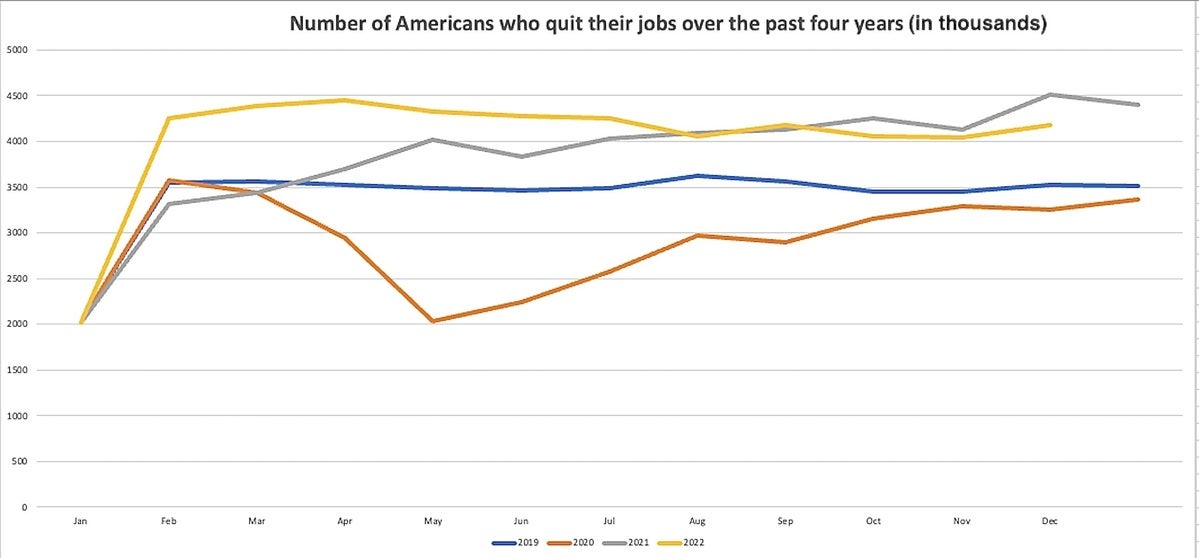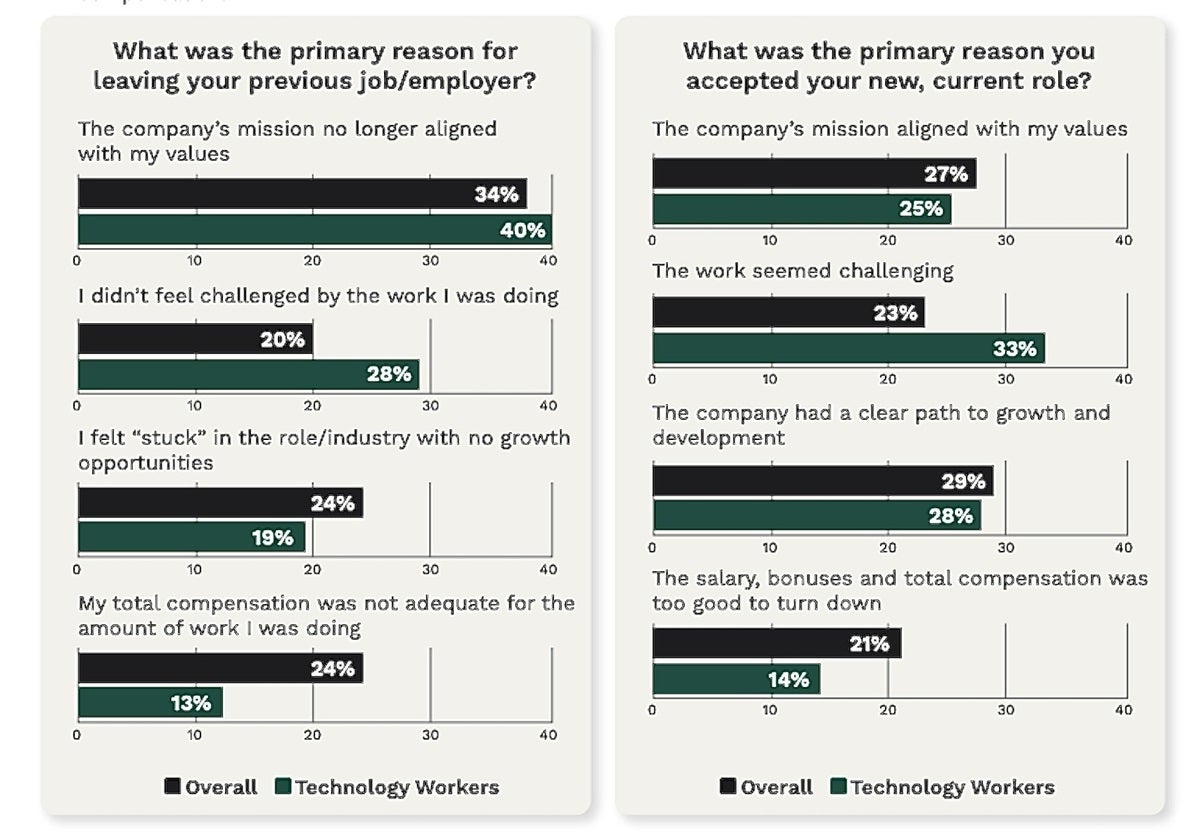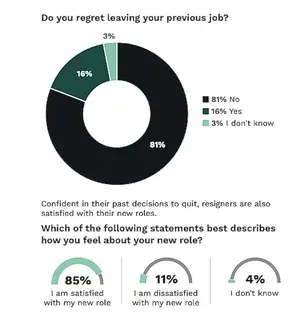































Tens of millions of American have quit their jobs since the beginning of the pandemic in what's become known as the Great Resignation -and a new study indicates those workers feel good about where they wound up.
The study by online education service Cengage Group shows "the Great Resigners" are generally happy about their workplace decisions, with an average 81% indicating they do not regret leaving their previous job.
The survey by the Cengage Group was conducted in November as a follow-up to research conducted exactly a year earlier. Cengage surveyed workers who quit to better understand their current job satisfaction, whether they switched industries, upskilled, or trained to start new roles, for example. Additionally, Cengage wanted to capture how inflation, a potential recession, and a string of tech layoffs affected workers.
Not only did those who quit not regret leaving their previous jobs, but 85% indicated they're satisfied in their new roles. Only a small percentage (6%) are considering returning to their previous job. The Cengage figures contradict other studies that found more workers who quit were unhappy after doing so.
 Bureau of Labor Statistics/Computerworld
Bureau of Labor Statistics/Computerworld Over the course of 2021, more than 47 million people quit their jobs, representing 23% of the total U.S. workforce, according to the Bureau of Labor Statistics (BLS). And in 2022, roughly 38 million more quit.
The Great Resignation, which began around April 2021, has seen more than four million US workers quitting their jobs every month. While numbers began to tick down slightly in September 2022, the latest data from the US Bureau of Labor Statistics showed 4.17 million people quit their jobs in November. That high-level churn is far from over, even if some high-profile layoffs have been dominating news in recent weeks.
"While the recent layoffs certainly impact the balance of power, especially for those at big tech companies, in my view the tech sector is very much a perennial candidate's market," said Jim Chilton, CTO of Cengage Group. "With the quick pace at which technology advances, there is always a need for new skills and new talent. The tech industry isn't the only market for tech talent. There is demand for technologists in every single industry and we're seeing talent being scooped up by startups and enterprises in other industries."
 Cengage Group
Cengage Group One of the main reasons organizations are struggling to fill vacancies - 200,000 of those open positions are in IT - is a shortage of people with the right skills (45%) ahead of inability to match expectations of flexible work models (39%), according to data from research firm IDC.
One of the top consequences of the Great Resignation was an increased workload on remaining employees (52%), according to IDC.
Amy Loomis, a research vice president for IDC's Future of Work group, said her data shows people quit their jobs over the past two years for five main reasons:
The continued turnover of employees - despite concerns of a looming recession and high inflation - suggests tech talent and others aren't regretting their decisions to leave, Loomis said.
So, where did all the quitters go? In Cengage Group's 2021 survey, those who quit were asked if they planned to stay in the same industry or make a change; their responses were almost a perfect 50/50 split on what they planned to do. In 2022, the same scenario played out: half switched industries and half stayed in the same industry.
One in five quitters (21%) who switched careers chose technology as their new career, according to the survey.
"Due to the ever-present need for new talent, workers with a baseline of tech skills can quickly acquire the requisite training or certifications necessary to earn themselves a highly compensated role in a matter of months, not years," Chilton said. "Additionally, many tech companies offer sponsored training opportunities, where newcomers can learn while they earn. When you factor in the soaring costs of higher education, switching into tech makes a lot of sense."
 Cengage Group
Cengage Group One-third (34%) of those who quit did so because the company's mission no longer aligned with their values. Nearly one in four (24%) who quit said they felt "stuck" in their role or in an industry with no growth opportunities, according to Cengage Group.
When it came to accepting their new, role, the highest number of Great Resigners (30%) indicated their new company had a clear path to growth and development, followed by 27% who said the company's mission aligned with their values.
Tech workers were more likely to be satisfied with their new roles than those in other industries, according to Cengage. For example, 86% of technology workers indicated they're satisfied with their new jobs, compared to 69% of healthcare workers who were happy.
"On the tech side, career switcher satisfaction likely lies in the sector's commitment to their upskilling and professional development," Chilton said. "Three in four said access to employer-paid training was an important factor in accepting their new job, and 77% of those who switched to technology work for an employer that provides access to upskilling.
"In short, tech workers are more satisfied because they tend to have access to the training necessary for them to perceive a clear upward career trajectory."
Despite the findings by Cengage, other surveys have shown that employees who quit over the past few years regretted the decision. For example, human resources and payroll services provider Paychex recently released survey results from 800 employees and 300 employers that showed eight of 10 workers who quit during the Great Resignation regretted it, including an overwhelming 89% of Gen Zers.
Only about half of Paychex's survey respondents indicated they're satisfied with mental health (54%) and work-life balance (43%) in their new workplace, with Gen Zers reporting the lowest levels of positive mental health and work-life balance. Sixty-eight percent of employees attempted to get their jobs back, but only 27% of employers have rehired employees that left during the Great Resignation, according to Paychex.
A survey of 2,500 workers from The Muse "found that almost three-quarters of workers (72 percent) experienced either 'surprise or regret' that the new position or new company they quit their job for turned out to be 'very different' from what they were led to believe. Nearly half (48 percent) of these workers said they would try to get their old job back."
And a poll commissioned by USA Today found that just 26% of job switchers liked their new job enough to stay.
So, who to believe? Well, there are still many more open jobs than people to fill them in the US and in other countries. In the US, more than 5.6 million jobs went unfilled in October 2022, according to the BLS, and unemployment has hit a 50-year-low, remaining between 3.5% and 3.7% for most of 2022. In technology, unemployment is just 1.8%.
The upshot: regardless of whether employees were happy with their job change, they've still got plenty of options.
There was another a shift in dynamics during the Great Resignation, with many employers changing decades-long practices to expand their talent pools. They dropped degree requirements and added or expanded professional development and education opportunities to show new hires and current employees a potential for growth.
"Those tech workers who left either voluntarily or were let go do not seem to be having issues finding new employers - especially those who are highly skilled," Loomis said. "I don't know if they are commanding the 10% to 20% over [current] salary offers they were in 2022, but they are definitely in high demand."
 Hot Tags :
Technology Industry
Remote Work
IT Jobs
Careers
IT Skills
Hot Tags :
Technology Industry
Remote Work
IT Jobs
Careers
IT Skills